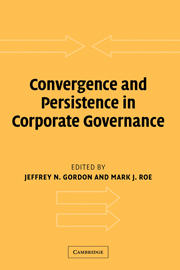Book contents
- Frontmatter
- Contents
- List of figures
- List of tables
- List of contributors
- Acknowledgments
- Introduction
- PART I Systemic issues
- PART II Government players
- PART III Specific institutions
- 8 The politics of corporate convergence
- 9 Ungoverned production
- 10 Convergence of substantive law and convergence of enforcement: a comparison
- 11 Cross-shareholding in the Japanese keiretsu
- Index
9 - Ungoverned production
Published online by Cambridge University Press: 04 March 2010
- Frontmatter
- Contents
- List of figures
- List of tables
- List of contributors
- Acknowledgments
- Introduction
- PART I Systemic issues
- PART II Government players
- PART III Specific institutions
- 8 The politics of corporate convergence
- 9 Ungoverned production
- 10 Convergence of substantive law and convergence of enforcement: a comparison
- 11 Cross-shareholding in the Japanese keiretsu
- Index
Summary
The debate about convergence is at bottom, of course, a debate about the competitive viability of two species or flavors of capitalism. The first might be called the neoclassical synthesis, to underscore its reliance on coordination through market exchange, or shareholder capitalism, to underscore the related idea that the corporation exists for the benefit of its equity owners. It is best represented, in intellectual spirit if not in fact, by the United States. The second form is sometimes referred to as stakeholder capitalism, to emphasize its assumption that the corporation is a community (like the larger society of which it is a part), and should therefore be jointly controlled and in that sense “owned” by all those – suppliers of labor as well as of capital or components – who collaborate in production. Its exemplars are Germany and most especially Japan. In this brief chapter I argue that the world's economies are not converging on either shareholder or stakeholder capitalism, nor again on a hybrid of the two or their ecological coexistence. The claim is, rather, that competitive pressures are driving firms towards a novel form of production organization based on collaborative problem-solving techniques pioneered by the Japanese but elaborated elsewhere in ways with crucial elements of the Japanese system within which they were originally housed. Whether the discipline imposed on firms by the diffusion of these new methods produces convergence on “the one best way” in the sense supposed by the framing debate is a question reserved to the conclusion.
- Type
- Chapter
- Information
- Convergence and Persistence in Corporate Governance , pp. 310 - 327Publisher: Cambridge University PressPrint publication year: 2004
- 3
- Cited by



